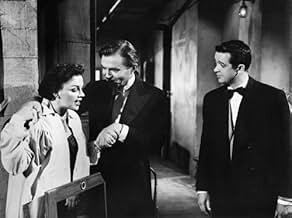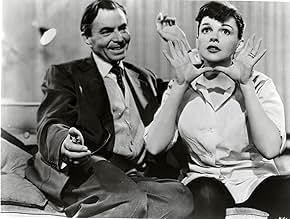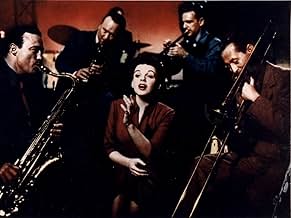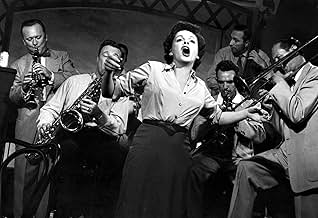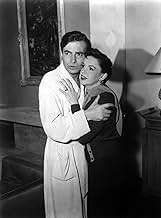NOTE IMDb
7,5/10
21 k
MA NOTE
Une vedette de cinéma aide une jeune chanteuse et actrice à trouver la gloire, alors même que l'âge et l'alcoolisme mettent sa propre carrière dans une spirale infernale.Une vedette de cinéma aide une jeune chanteuse et actrice à trouver la gloire, alors même que l'âge et l'alcoolisme mettent sa propre carrière dans une spirale infernale.Une vedette de cinéma aide une jeune chanteuse et actrice à trouver la gloire, alors même que l'âge et l'alcoolisme mettent sa propre carrière dans une spirale infernale.
- Réalisation
- Scénario
- Casting principal
- Nommé pour 6 Oscars
- 7 victoires et 14 nominations au total
Tommy Noonan
- Danny McGuire
- (as Tom Noonan)
John Alban
- Academy Awards Attendee
- (non crédité)
Laurindo Almeida
- Guitarist
- (non crédité)
Leon Alton
- Usher
- (non crédité)
Rudolph Anders
- Mr. Ettinger
- (non crédité)
David Armstrong
- Soundman
- (non crédité)
Phil Arnold
- Agent #3
- (non crédité)
Nadine Ashdown
- Esther - Age 6
- (non crédité)
Gertrude Astor
- Racetrack Spectator
- (non crédité)
Avis à la une
The 1954 musicalized version of A Star Is Born is a great film. Judy Garland and James Mason (both Oscar nominated) turn in terrific performance as Esther and Norman. Like its 1937 predecessor (which starred Janet Gaynor and Fredric Marchboth Oscar nominated), the 1954 version follows the ups and down of two people set against the vicious world of Hollywood. The newer version sticks to the basic story but adds some great numbers for Garland, including "The Man That Got Away" and "I Was Born in a Trunk." In a major comeback, Garland had not worked in films since Summer Stock (1950), and her performance here is the best of her career. That she lost the Oscar to Grace Kelly for The Country Girl is one of Hollywood's great inequities. Mason lost to Marlon Brando for On the Waterfront. Garland sings superbly and is a great comic and dramatic actress. Her Esther is more vulnerable than Gaynor's just as Mason's Norman is more pathetic than March's. I love both versions. Charles Bickford and Jack Carson play the other major parts, played by Adolphe Menjou and Lionel Stander in 1937. Two major supporting roles from the 1937 version were cut from the 1954 version: Esther's first Hollywood friend (Andy Devine) and her intrepid grandmother (the great May Robson). But Garland's musical numbers make up for their absence. Oddly, despite the great hullabaloo surrounding A Star Is Born, it was not nominated for best picture, and George Cukor was bypassed in the directing category. One of the best musicals ever made.
Is it possible to watch this fictional story without digressing to thoughts about the real life story of Judy Garland? For me it isn't. Both are permanently intertwined. And it's not just the parallel between fiction and fact, but also the dark, brooding, melancholy mood they engender, like ghosts calling out to us from a Hollywood that no longer exists.
The film's storyline is well known. I won't belabor it here, except to say that it communicates an honest and introspective indictment of the entertainment industry as it once was. The story can be thought of as a kind of archetypal Hollywood memoir, expressed as a musical.
But musicals are supposed to be upbeat, lighthearted, fun. This one isn't. Moments of humor and joy are swept away in a cascade of emotional pain and tragedy. Fiction mimics real life. How appropriate that the film's signature song "The Man That Got Away" is one that is so uncompromisingly serious, poignant, and smoldering ... a perfect vehicle for Judy Garland.
Some say she had the greatest singing voice of any entertainer in the twentieth century. This film lends credence to that assertion. Every song she sings is performed with such consummate verve, such emotional commitment that she seems to be singing not just for her contemporaries, but also for generations to come. Indeed, she is. My personal favorite is the "Born In A Trunk" segment, all fifteen minutes of it. Surrounded by sets of true cinematic art, she belts out one tune after another, including, of course, the poignant "Melancholy Baby".
Judy's singing and the music itself are what make the movie so memorable. But she also demonstrates her considerable acting talent. And the acting of other cast members is fine, especially the performances of James Mason and Jack Carson. I do think that the film was, and still is, too long, the result of an overly ambitious screenplay.
That Judy Garland was denied the Best Actress Oscar is poignant. But her talent was so massive, her uniqueness was so special, maybe fate required a compensatory level of pain and tragedy, as a prerequisite of legend.
The film's storyline is well known. I won't belabor it here, except to say that it communicates an honest and introspective indictment of the entertainment industry as it once was. The story can be thought of as a kind of archetypal Hollywood memoir, expressed as a musical.
But musicals are supposed to be upbeat, lighthearted, fun. This one isn't. Moments of humor and joy are swept away in a cascade of emotional pain and tragedy. Fiction mimics real life. How appropriate that the film's signature song "The Man That Got Away" is one that is so uncompromisingly serious, poignant, and smoldering ... a perfect vehicle for Judy Garland.
Some say she had the greatest singing voice of any entertainer in the twentieth century. This film lends credence to that assertion. Every song she sings is performed with such consummate verve, such emotional commitment that she seems to be singing not just for her contemporaries, but also for generations to come. Indeed, she is. My personal favorite is the "Born In A Trunk" segment, all fifteen minutes of it. Surrounded by sets of true cinematic art, she belts out one tune after another, including, of course, the poignant "Melancholy Baby".
Judy's singing and the music itself are what make the movie so memorable. But she also demonstrates her considerable acting talent. And the acting of other cast members is fine, especially the performances of James Mason and Jack Carson. I do think that the film was, and still is, too long, the result of an overly ambitious screenplay.
That Judy Garland was denied the Best Actress Oscar is poignant. But her talent was so massive, her uniqueness was so special, maybe fate required a compensatory level of pain and tragedy, as a prerequisite of legend.
On a brief getaway this past weekend, the hotel where I was staying had TCM (Turner Classic Movies) on its cable roster and, lo! and behold, there was Judy singing and acting her heart out in letterbox and stereo sound. TCM...you're the best!
It was the restored version, thank the good Lord, with that sad reminder of Warner Brothers' pathetic timidity in trashing Cukor's original cut, but recalling for us his masterful use of the widescreen ratio. (A "formatted" version would be simply unwatchable, what with numerous scenes played by actors perched on the outer reaches of the screen, opposite each other.)
James Mason turns in an absolutely brilliant performance, especially when one recalls the rigors of production, with filming going months over schedule, due to Judy's unhappy vicissitudes (so evident in her appearance even within the same scene!) With the very able support of Charles Bickford, as the most benign studio head ever, and Jack Carson proving why Warners kept him employed so often for so many years.
Plus musical direction taking fabulous advantage of Warners' studio orchestra (and WB's sound technicians who were, for several decades running, the envy of all the other major studios), and arrangements that must have overwhelmed first-run audiences with their incredible richness.
It's a must-see, all right, and is in a class by itself, among the several screen versions of this beloved Hollywood saga.
It was the restored version, thank the good Lord, with that sad reminder of Warner Brothers' pathetic timidity in trashing Cukor's original cut, but recalling for us his masterful use of the widescreen ratio. (A "formatted" version would be simply unwatchable, what with numerous scenes played by actors perched on the outer reaches of the screen, opposite each other.)
James Mason turns in an absolutely brilliant performance, especially when one recalls the rigors of production, with filming going months over schedule, due to Judy's unhappy vicissitudes (so evident in her appearance even within the same scene!) With the very able support of Charles Bickford, as the most benign studio head ever, and Jack Carson proving why Warners kept him employed so often for so many years.
Plus musical direction taking fabulous advantage of Warners' studio orchestra (and WB's sound technicians who were, for several decades running, the envy of all the other major studios), and arrangements that must have overwhelmed first-run audiences with their incredible richness.
It's a must-see, all right, and is in a class by itself, among the several screen versions of this beloved Hollywood saga.
Much has been written about this movie (to extremely great length) in other reviews, so I'll try to keep this fairly brief and concise.
First, the restored version runs at 176 minutes. The movie originally ran at 181 minutes, but was cut to 154 minutes when theater owners complained that they were losing money due to the excessive length. The cut destroyed the integrity of the movie - director Cukor never saw the movie again. However, the restored version contains stills to replace some of the cut footage, and gives a better sense of the film's power and scope.
Second, all four major studio versions of the story (including "What Price Hollywood?") have their own merits and differ greatly from one another. If you like the story, see them all and compare for yourself. It's quite fun to compare!
Third, definitely see this version for Judy. Sure, Judy's "The Man That Got Away" may be the greatest musical moment on cinema, but it's her dramatic performance that will keep your attention over almost three hours. James Mason is on target, and the supporting cast is fine, but Judy just dominates the screen. It's an opportunity to see a true genius in action at the absolute height of her powers. For more dramatic Judy, see her in "The Clock".
George Cukor was acclaimed as the great director of actresses, and he raises Judy to the height she deserves. I love Judy. This is a 10 out of 10.
First, the restored version runs at 176 minutes. The movie originally ran at 181 minutes, but was cut to 154 minutes when theater owners complained that they were losing money due to the excessive length. The cut destroyed the integrity of the movie - director Cukor never saw the movie again. However, the restored version contains stills to replace some of the cut footage, and gives a better sense of the film's power and scope.
Second, all four major studio versions of the story (including "What Price Hollywood?") have their own merits and differ greatly from one another. If you like the story, see them all and compare for yourself. It's quite fun to compare!
Third, definitely see this version for Judy. Sure, Judy's "The Man That Got Away" may be the greatest musical moment on cinema, but it's her dramatic performance that will keep your attention over almost three hours. James Mason is on target, and the supporting cast is fine, but Judy just dominates the screen. It's an opportunity to see a true genius in action at the absolute height of her powers. For more dramatic Judy, see her in "The Clock".
George Cukor was acclaimed as the great director of actresses, and he raises Judy to the height she deserves. I love Judy. This is a 10 out of 10.
Marked by a pervasive sense of melancholy, the 1954 musical version of the familiar Hollywood warhorse will forever be remembered as Judy Garland's most acclaimed work in films. Even though she would go on to a handful of films in the early 1960's, this was her last leading role in a major Hollywood production, an ironic point since she plays an emerging movie star on the rise. True, she doesn't look her best in the film, but her fulsome talent is on full, heart-wrenching display as Esther Blodgett, an obscure but thriving band singer who becomes movie star Vicki Lester thanks to Norman Maine, an alcoholic has-been movie star in career free-fall. Their love story and the opposing trajectories of their careers are tracked meticulously by Moss Hart's shrewdly observed screenplay and George Cukor's sensitive direction.
The double-sided 2000 DVD provides the 176-minute restored version, which is just five minutes less than what was shown at the original premiere. Until 1983, the half-hour of footage excised after the premiere was thought lost, but film historian Ron Haver found much of it and supervised an extraordinary restoration effort that includes a necessary albeit brief use of production stills to match up with the complete soundtrack. Even with such technicalities, the resulting film is even more of a landmark musical drama, emotionally resonant in spite of certain pacing issues with the storyline. Cukor's approach is probably more leisurely than the relatively hard-boiled material requires since he includes so many establishing and lengthy shots, but his direction shows his legendary sensitivity toward actors.
While he comes across a bit too robust as a fading matinée idol, James Mason vigorously captures Norman's scornful pride and self-pity. He may lack Fredric March's innate sense of vulnerability in the original, but Mason makes the character's inner torment more palpable. As for Garland, she brings so much of her own history to Esther/Vicki that her scenes feel alive with her vibrant, masochistic personality. She is aided immeasurably by the masterful songs of Harold Arlen and Ira Gershwin, most significantly her torchy rendition of "The Man That Got Away", as perfect a musical movie moment as has been ever produced. While her work in the fifteen-minute "Born in the Trunk" sequence is impressive, it is really later in the film when she soars, in particular, when she segues from the tap-happy "Lose That Long Face" into a breakdown scene in her dressing room with sympathetic studio head Oliver Niles portrayed with his typically stentorian fervor by Charles Bickford.
The print condition and sound quality on the DVD are superb. There are also some fascinating extras on the B-side starting with three alternative takes on "The Man That Got Away", each distinctive in presentation with costume and lighting changes, a must for Garland fans. Also included is a very brief deleted number within the "Born in the Trunk" sequence", "When My Sugar Walks Down the Street". Three vintage pieces have been gathered - a brief newsreel piece of the premiere, a four-minute clip of the Coconut Grove premiere party held after the premiere, and most interestingly, a half-hour kinescope akin to the current-day red carpet pre-shows with an amazing parade of period stars expressing little more than good wishes on their way to the theater. Lastly, the theatrical trailers for all three versions of "A Star Is Born" are also included.
The double-sided 2000 DVD provides the 176-minute restored version, which is just five minutes less than what was shown at the original premiere. Until 1983, the half-hour of footage excised after the premiere was thought lost, but film historian Ron Haver found much of it and supervised an extraordinary restoration effort that includes a necessary albeit brief use of production stills to match up with the complete soundtrack. Even with such technicalities, the resulting film is even more of a landmark musical drama, emotionally resonant in spite of certain pacing issues with the storyline. Cukor's approach is probably more leisurely than the relatively hard-boiled material requires since he includes so many establishing and lengthy shots, but his direction shows his legendary sensitivity toward actors.
While he comes across a bit too robust as a fading matinée idol, James Mason vigorously captures Norman's scornful pride and self-pity. He may lack Fredric March's innate sense of vulnerability in the original, but Mason makes the character's inner torment more palpable. As for Garland, she brings so much of her own history to Esther/Vicki that her scenes feel alive with her vibrant, masochistic personality. She is aided immeasurably by the masterful songs of Harold Arlen and Ira Gershwin, most significantly her torchy rendition of "The Man That Got Away", as perfect a musical movie moment as has been ever produced. While her work in the fifteen-minute "Born in the Trunk" sequence is impressive, it is really later in the film when she soars, in particular, when she segues from the tap-happy "Lose That Long Face" into a breakdown scene in her dressing room with sympathetic studio head Oliver Niles portrayed with his typically stentorian fervor by Charles Bickford.
The print condition and sound quality on the DVD are superb. There are also some fascinating extras on the B-side starting with three alternative takes on "The Man That Got Away", each distinctive in presentation with costume and lighting changes, a must for Garland fans. Also included is a very brief deleted number within the "Born in the Trunk" sequence", "When My Sugar Walks Down the Street". Three vintage pieces have been gathered - a brief newsreel piece of the premiere, a four-minute clip of the Coconut Grove premiere party held after the premiere, and most interestingly, a half-hour kinescope akin to the current-day red carpet pre-shows with an amazing parade of period stars expressing little more than good wishes on their way to the theater. Lastly, the theatrical trailers for all three versions of "A Star Is Born" are also included.
Le saviez-vous
- AnecdotesGeorge Cukor offered Marlon Brando the role of Norman Maine on the set of Jules César (1953). "Why would you come to me?" asked Brando. "I'm in the prime of my life... If you're looking around for some actor to play an alcoholic has-been, he's sitting right over there"- pointing at his costar James Mason, who got the part.
- GaffesAfter Vicki comes home and she performs in her house for Norman, the doorbell rings and he goes to the door to accept a package for Vicki. His hair is all mussed-up when he goes to the door, but after he closes it and the camera goes back to him, there isn't a hair out of place. Then he walks over to where Vicki is and his hair is all mussed-up again.
- Citations
[last lines]
Vicki Lester: Hello, everybody. This is Mrs. Norman Maine.
- Versions alternativesContrary to popular belief, the film was not originally at 181 minutes, but rather 196 (3hrs. and 16mins.) at a post-premiere shown on August 8, 1954 in Huntington Park, California. After its second post-premiere - the very next day - two scenes of 15 minutes total were deleted; making the film run its original world debut length at 181 minutes. One was a number called "When My Sugar Walks Down the Street" that came after Judy's take of "I'll Get By" in the 'Born in the Trunk' sequence, the other was a scene where Garland and James Mason's characters (Vicki and Norman) were picnicking on the beach; production stills and promotional advertisements are the only thing left in existence of the footage. After its world premiere on September 29, 1954, 27 minutes was cut, bringing it down to a mediocre 154 time length. Those scenes were:
- 1) Esther quitting the band
- 2) The Trinidad Coconut Oil Shampoo
- 3) Esther working at a drive-in
- 4) Norman being driven away drunk in his car
- 5) Norman inquiring Esther's old landlady
- 6) Spotting Esther on the TV commercial
- 7) Tracking down Esther at her new boarding residence
- 8) Driving down the strip - Esther getting sick
- 9) "Here's What I'm Here For" musical number - Norman proposes
- 10) "Lose That Long Face" musical number - Vicki breaks down
- ConnexionsFeatured in Film Night: Special: Forty Years in Hollywood (1970)
- Bandes originalesGotta Have Me Go with You
(uncredited)
Music by Harold Arlen
Lyrics by Ira Gershwin
Performed by Judy Garland with Jack Harmon & Don McKay
Meilleurs choix
Connectez-vous pour évaluer et suivre la liste de favoris afin de recevoir des recommandations personnalisées
Détails
- Date de sortie
- Pays d’origine
- Langue
- Aussi connu sous le nom de
- Nace una estrella
- Lieux de tournage
- Société de production
- Voir plus de crédits d'entreprise sur IMDbPro
Box-office
- Budget
- 5 019 770 $US (estimé)
- Montant brut aux États-Unis et au Canada
- 4 335 968 $US
- Montant brut mondial
- 4 350 001 $US
- Durée
- 2h 34min(154 min)
- Rapport de forme
- 2.55 : 1
Contribuer à cette page
Suggérer une modification ou ajouter du contenu manquant








